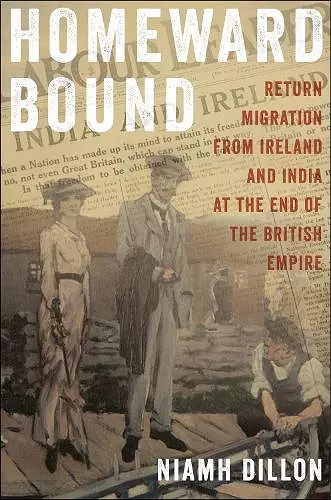Homeward Bound
Return Migration from Ireland and India at the End of the British Empire
Format:Hardback
Publisher:New York University Press
Published:27th Dec '22
Should be back in stock very soon

Firsthand accounts of migrants who settled in Britain offer new insights into empire, belonging, migration, and diaspora
Homeward Bound shines a light on a neglected aspect of twentieth-century migration history. It compares two groups of migrants—Southern Irish Protestants and the British in India—who "returned" to Britain from Ireland and India after independence in 1922 and 1947. By looking across national boundaries, Niamh Dillon explores both individual and collective narratives of imperial identity in the late British Empire and the prompts for return.
For both groups, the success of national independence movements in the first half of the twentieth century was cataclysmic and prompted a large-scale migration to Britain. Between 1911 and 1926, the number of Protestants in the Irish Free State dropped from approximately 313,000 to 208,000, and much of the British population left India. Although these numbers are significant, these two groups have largely been ignored by historians and have not been compared before.
Though instability in the new political order and lack of livelihood were determining factors in the decision to migrate, Dillon argues that Southern Irish Protestants and the British community in India "returned" to Britain after independence principally because these former elites no longer had a clearly defined role in the new post-colonial era. Return migrants chose Britain because of continuing connections with it as "home," but often found their colonial experience was not valued in a country re-orienting itself to the post-war order. Through interviews with those who experienced these events first-hand and the recently opened files of the Irish Grants Committee at the National Archives in Britain, this book offers new insights into the history of migration and the affinity these migrants felt with Britain and with the empire.
"In Homeward Bound Niamh Dillon uses her unusually long experience of long in-depth oral history interviews to highlight the memories and feelings of men and women and their families faced with the sudden collapse of a British Empire which had seemed so secure, on which the sun had never set. Homeward Bound is rich with the detail of Dillon's own recordings. But her book is all too rare in two other ways. Firstly by also using archival sources, which allow some statistical analysis, it is a model of mixed methods. And secondly, through contrasting the 'twilight of empire' in India and Ireland she brings out the variety of personal experience in the same years. The Irish Protestants could hang on because they had land and business interests; those once closest to power in India simply fled. Her book not only tells rich stories; it is a model of historical analysis." (Paul Thompson, Emeritus Professor in Sociology at the University of Essex, founder-editor of Oral History and author of The Voice of the Past, The Edwardians, and Living the Fishing) "This excellent study opens up important new ground for many historians. It is a major contribution to understanding a relatively neglected aspect of Irish history, and adding understandings of Britishness and specifically Englishness. Moreover, it is a model of methods in comparative history, and scholars of both India and the British Empire will learn much from taking an Irish angle and perspective on their subjects." - Professor Richard S. Grayson, Goldsmiths, University of London "A compelling and highly original exploration of the end of empire through the moving comparative testimonies of southern Irish Protestants and British settlers in India. Dillon examines notions of 'home' and belonging, education, class and gender, and how these conflicted with independence movements and resistance to empire. The migrants' eventual decision to leave amounted to an 'imperial diaspora' as they adjusted to homes and lives in a post-colonial Britain." - Rob Perks, MBE, former Lead Curator of Oral History and Director of National Life Stories at the British Library "Follows the slow motion collapse of the British Empire, through the fine detail of archive and oral history. Dillon's fine-grained and sensitive discussion with two such communities, as they negotiate the meaning of 'home,' offers insights to similar groups, seeking a place as empires collapse throughout the world, and offers us routes out of dead end discourses of empire." - Patrick O'Sullivan, Visiting Professor of Irish Diaspora Studies, London Metropolitan University "Opens up new possibilities for oral history and is a welcome addition to the history of everyday imperialism. Not only does Dillon show how life history approaches can make colonial mentalities visible, but by taking a comparative approach she reveals how geographical and historical contexts shaped colonial consciousness. At the same time, the oral histories are deftly handled as evidence and to retell some remarkable stories." - Graham Smith, Deputy Head of the School of History, Classics and Archaeology, Newcastle University "Critically explores the changing meaning of 'home' for the individuals and families who composed Britain's imperial network. Featuring a wonderful combination of archival materials and oral histories, Homeward Bound provides a valuable comparison across imperial sites to examine commonalities and divergences in the meaning(s) of belonging." - Erica Wald, Senior Lecturer, Goldsmiths, University of London "
This rich and sensitive treatment looks at how the homes of both these groups were
more than family spaces, but also sites laden with imperial values. It is a history in uneasiness, of
tensions with local populations before they leave, and of not fitting in as expected when they
return 'home': viewed as not being a metropolitan elite, but rather another sector of the imperial diaspora.
ISBN: 9781479817313
Dimensions: unknown
Weight: 499g
256 pages